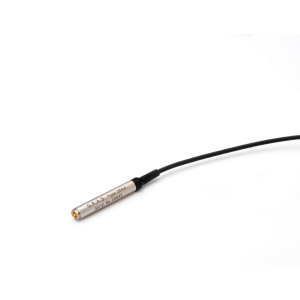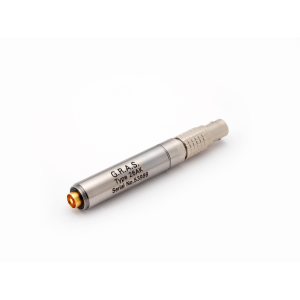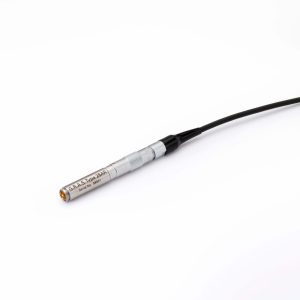The output from a condenser microphone is a very high-impedance signal and is therefore very sensitive to the capacitive loads of cables. This makes it necessary to introduce a driver with high input impedance and low output impedance. Such a driver is called a preamplifier.
The frequency range of a preamplifier is determined by its electronic circuit and is typically more than 200 kHz at the high end and 1-10 Hz at the lower end. The lower end is determined by the input impedance of the preamplifier and the capacitance of the microphone. High microphone capacitance gives a low cut-off frequency.
The dynamic range of a preamplifier is defined as the range between the highest level that the preamplifier can handle without distortion, and the lowest level it can measure. The highest level is related to the preamplifier’s supply voltage, whereas the lowest level is related to the electrical noise generated by the preamplifier itself.
There are today two different preamplifier principles in the world of acoustics. One is the traditional type for externally-polarized microphones often referred to as the “LEMO” type because of its 7-pin connector and has become an industry standard. It is voltage driven and can handle high voltage signals up to 50Vpeak.
The other principle uses a Constant Current Power (CCP) supply and was introduced around 1996 to the world of high-precision acoustics. Before that, the quality of CCP preamplifiers was not as good as the voltage driven LEMO types, but this is not the case today. A CCP preamplifier uses a Constant Current Power supply, which must be between 2 mA and 20 mA (nominally 4 mA), to produce a constant nominal voltage level of 12 Volt DC (referred to as the bias voltage). The output signal from the microphone superimposes fluctuations around this DC level. The great advantage of CCP preamplifiers is that they use a two-wire system, where the signal is superimposed on the wire through which the current is kept constant.
This means that simple co-axial cables can be used instead of the more complex 7-core cables used with the voltage driven LEMO types. This is traded off by accepting a lower upper limit in dynamic range (due to the lower driving voltage of a constant-current source) which limits the maximum output signal to approximately 8 Vpeak, and the necessity of having to use prepolarized microphones. The range of available prepolarized microphones is still not as wide as for externally-polarized microphones, although GRAS was the first in the world to introduce 1/4” prepolarized microphones and have also released a 1/8” prepolarized microphone.
GRAS microphone preamplifiers are all small, robust units optimised for acoustical measurements with condenser microphones. They are all compatible with measurement microphones as defined in the international standard IEC 61094 “Measurement Microphones, Part 4: Specifications for working standard microphones”.
All GRAS preamplifiers are built around a small, thick-film precision amplifier with very high input impedance. The casings are made of stainless steel for maximum strength and durability with minimal sensitivity to vibration and microphonics.
They will work within their specifications up to a temperature of 70°C (158°F). Special versions for use at temperatures up to 120°C (248°F) are available on request. The only effect of elevated temperature is a slight increase in inherent noise level. This will change the lower limit of the dynamic range of the microphone/preamplifier combination, thus limiting the ability to measure very low sound pressure levels.
CCP (Constant Current Power) is the same as IEPE (Integrated Electronic Piezo-Electric) and CCLD (Constant Current Line Drive) and is compatible with many other constant current driven products such as Deltatron®, Isotron, etc.
Basket Content:
0 items - 0,00 kr.Showing 1–12 of 23 results




















